Evaluation of citrus varieties, rootstocks suitable for quality production and processing. Standardization of production and protection techniques for attaining sustainable fruit production. Post harvest handling of fruits to increase shelf life of various fruits.
Dr Anil Kumar Sangwan,
Director RRS Abohar
Ph. 01634-225326
M: 81460-24444
Email: directorrfrsabohar@pau.edu,
sangwan2111@pau.edu
Research on guava, ber, development of production technologies and nursery production.

Dr D R Bhumbla Regional Research Station, Ballowal Saunkhri (Shahid Bhagat Singh Nagar) is a constituent unit of Punjab Agricultural University, Ludhiana (Punjab). It is located in the Shivaliks foothills of Punjab, (latitude 31o 6’ 5”N and longitude 76 o 27’ 26” E) at height of 355m amsl. The degradation of the Shivalik ecosystem remained a matter of concern even before independence and thereafter. The State of Punjab paid special attention to the faster rehabilitation of this region because of its ecological significance. A pilot project named Kandi Watershed Area Development Project (KWADP) was initiated by the state Government with the World Bank assistance for integrated development of this region in April 1980. The Punjab Agricultural University was involved to provide research support to the project. A research station was established in 1982 at village BallowalSaunkhri near Balachaur in the heart of Kandi area. Soon after that, the research set up was strengthened and research station was upgraded to a Zonal Research Station for Kandi Area under National Agricultural Research Project currently known as Dr. D R Bhumbla Regional Research Station, Ballowal Saunkhri.
Dr Manmohanjit Singh
Ph. 01885-241607
M: 98880-14851
Email: mmjsingh@pau.edu
Research on cotton, wheat, pulses, vegetable and fruits (guava, grapes, orange, ber etc.), Water Management, Brackish Water Management in Field, Vegetables, Horticulture and Forest Crops, Forestry and Agro-Forestry, Seed Production.
Dr Karamjit Singh Sekhon
Ph. 0164-2212159
M: 94173-68994
Email: directorrsbti@pau.edu

The Regional Research Station, Faridkot, established in April 1970, has about 55 acre of rich fertile, leveled and well laid out farm area for experimentation. Historically, the campus of this station is located at the same place where “DAVIS MODEL AGRICULTURE FARM AND FARMER’S HOUSE” was established in 1910 for the welfare of Farmers of Princely State of Faridkot, testified by the entrance gate of the station. It is located in the agriculturally most potential region – Zone IV (South- Western Zone) of Punjab. The Zone IV lies between the central Plain Zone on the North – East and Western Zone on the South – West. The Zone IV comprises 21 development blocks: Bhikhwind, Patti and Valtoha of Ameritsar district; Zira, Ghall Khurd and Ferozpur of Ferozpur district; Moga-I, Moga-II, Nihalsingh Wala and Bagha Purana of Moga district; Phul, Rampura and Talwandi Sabo of Bhatinda district; Mansa and Budhlada of Mansa district; and Sehna, Barnala, Sangrur, Sunam and Lehragaga of Sangrur district. It covers about 10,049 km2 (14,91,300 ha, gross cropped area) area, representing nearly 20 per cent area of the state.
The altitude of the zone varies between 200 to 300 m above mean sea level. The soil are largely of alluvial origin and coarse to fine in texture. Mostly the soils are alkaline in reaction having pH more than 7.5. The water table in the region varies from 2 m to 10m below the ground level. The sub-soil water is brackish and salty, which is not fit for irrigation to crops. The average annual rainfall and potential evapo-transpiration of the zone is 419 mm and 1424 mm, respectively. The principal Kharif crops of the zone are rice, cotton, sugarcane and mung bean. The important Rabi crops are wheat, chickpea, rapeseed and mustard. In addition, horticulture and vegetable crops also cover a considerable area in this zone.
The research on cotton has since been strengthened and accelerated under the All India Coordinated Research on Cotton sponsored and sanctioned by the ICAR in 1967. The erstwhile PAU catered to the requirements of both Punjab and Haryana at that time. Initially, there was one main center at Hisar and a sub-centre at Ludhiana under the project. The HAU came into existence in December, 1970 and PAU was thus left with only one sub-centre at Ludhiana. However, in April 1972 the Ludhiana sub-centre was upgraded into main center with a sub-centre at Faridkot, later in 2000 Faridkot was designated as the main center and in 2011 the sub-centre from Ludhiana was shifited to Bathinda.
Realizing the importance of sugarcane crop in the State, Indian Council of Agricultural Research sanctioned All India Co-ordinated Research Project on Sugarcane at Regional Research Station, Faridkot during 1995. Faridkot Station was working as coordinating Centre for conducting Zonal trials in breeding and agronomy disciplines in North West Zone. In 2021 the coordinating centre was shifited to Gurdaspur, however sugarcane research on priority areas such as water and nutrient use efficiency are still being carried out at this station. In addition to cotton and sugarcane, multi location testing on bajra, chickpea, mungbean, arhar, lentil, sunflower and mustard crops is also conducted at this station.
Research on high income horticultural crops, avocado, almond, dragon fruit and strawberry is initiated during 2022.
Name: Dr Kuldeep Singh
Tel: 01639-251244
Mob: 9417175970
Email: rsdirector-faridkot@pau.edu
Breeding of rice, wheat, oil seeds, pulses, sugarcane and horticultural crops (mango, litchi, loquat, pear, lemon, plum and peach), agronomic evaluation of field crops, soil & water testing, screening of breeding material against major pests, seed/nursery production of improved varieties of field/fruit crops and production of bioagents for pest management.
Name: Dr Harpal Singh Randhawa
Ph.: 01874-220825
M.No.: 88720-03010
E-mail: harpals_randhawa@pau.edu
RRS, KAPURTHALA AT GLANCE
The Regional Research Station, Kapurthala, comprises three units of land, covering a total of about 247 acres. These units established by the Maharaja of the erstwhile Kapurthala state for agriculture and allied uses consist of the following:
The main objectives of the Regional Research Station, Kapurthala, are to carry out research and development on Sugarcane crop to cater the needs of sugarcane growers and sugar industry of Punjab. Besides, multilocation trials of other crops and quality seed production (Breeder, foundation & certified) improved varieties of various crops especially rice, wheat, maize, mung and berseem and its distribution to produce farmers of state foundation seed of.
MANDATE AND OBJECTIVE OF CENTRE
Sugarcane Research & Development Activities
Seed Production
Dr Paramjit Singh
M: 98146-93189
Email: paramjit1963@pau.edu
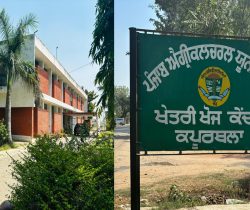
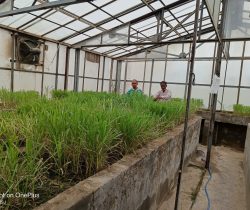
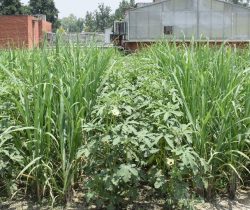
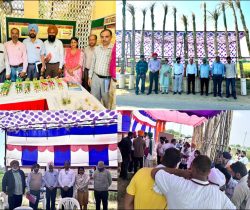
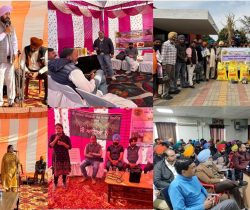
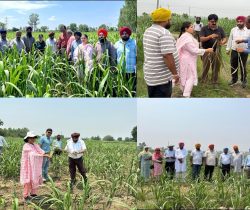
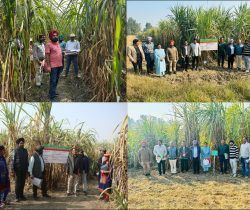
Research on rice, wheat, pulses and seed production of different crops
Dr. Bhupinder Singh Dhillon
M: 9855556672
Email: rrs-ajnala@pau.edu
Research on guava, ber, development of production technologies and nursery production.
Dr R.S. Bhoora
Ph. 0175-2381473
M: 92574-14777
Email: rfr-ptl@pau.edu
Development of need-based technologies in the sub mountaneous region of the Punjab, production of pedigree fruit plant nursery (mango, litchi, etc.)
Dr Sumanjit Kaur
Ph. 01883-285075
M: 88724-28885
Email: sumanjit@pau.edu
Nursery production of citrus and other plants.
Dr Tanjeet Singh Chahal
M: 98141-37547
Email: tanjeetchahal@pau.edu